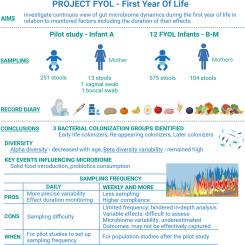Sampling frequency matters: mapping of the healthy infants' gut microbiome during the first year of life
IF 5.8
Q1 MICROBIOLOGY
引用次数: 0
Abstract
Early life events significantly influence the developing gut microbiome, yet the response time and duration of microbiome changes to specific factors, such as vaccination or solid food introduction, remain unclear. Consequently, determining the optimal sampling frequency to monitor gut microbiome development is challenging. This study monitored gut microbiome plasticity using 16S rRNA gene sequencing almost daily in one infant (A) and weekly in 12 others (B–M) during their first year. Changes were linked to external factors and their duration analyzed. Three bacterial colonization groups emerged: "Early-life colonizers," "Re-appearing colonizers," and "Later-colonizers." Weekly sampling underestimated microbiome variability, as individual samples within the same week differed by over 1 Shannon index, and most of the weekly coefficients of variation of different alpha diversity indices in the first 23 weeks were higher than 10 %. Alpha diversity variability decreased with age, but beta diversity variability remained high. Key events like solid food introduction and probiotics caused gradual but significant bacterial composition changes, with effects varying among infants. Sparse weekly sampling hindered a detailed understanding of the impact of maternal microbiome, diet, probiotics, vaccinations, and unforeseen variables. Analysis of weekly variability in alpha and beta diversity suggests that such rare sampling may not be sufficient in terms of the outcomes of interest.

采样频率很重要:绘制健康婴儿出生后第一年的肠道微生物组
早期生活事件显著影响发育中的肠道微生物组,但微生物组变化对特定因素(如接种疫苗或引入固体食物)的反应时间和持续时间尚不清楚。因此,确定监测肠道微生物群发育的最佳采样频率具有挑战性。该研究在婴儿出生后的一年内,几乎每天使用16S rRNA基因测序监测一名婴儿(A)的肠道微生物群可塑性,并在另外12名婴儿(B-M)中每周使用16S rRNA基因测序。变化与外部因素有关,并分析其持续时间。出现了三个细菌定植组:“早期定植者”、“重新出现的定植者”和“后期定植者”。周采样低估了微生物组变异性,同一周内单个样品差异超过1个Shannon指数,前23周不同α多样性指数的周变异系数大多大于10%。α多样性变异性随年龄增长而降低,但β多样性变异性保持较高水平。引入固体食物和益生菌等关键事件引起了逐渐但显著的细菌组成变化,对婴儿的影响各不相同。稀疏的每周采样阻碍了对母体微生物组、饮食、益生菌、疫苗接种和不可预见变量影响的详细了解。对α和β多样性的周变异性分析表明,就感兴趣的结果而言,这种罕见的抽样可能不够。
本文章由计算机程序翻译,如有差异,请以英文原文为准。
求助全文
约1分钟内获得全文
求助全文
来源期刊

Current Research in Microbial Sciences
Immunology and Microbiology-Immunology and Microbiology (miscellaneous)
CiteScore
7.90
自引率
0.00%
发文量
81
审稿时长
66 days
 求助内容:
求助内容: 应助结果提醒方式:
应助结果提醒方式:


